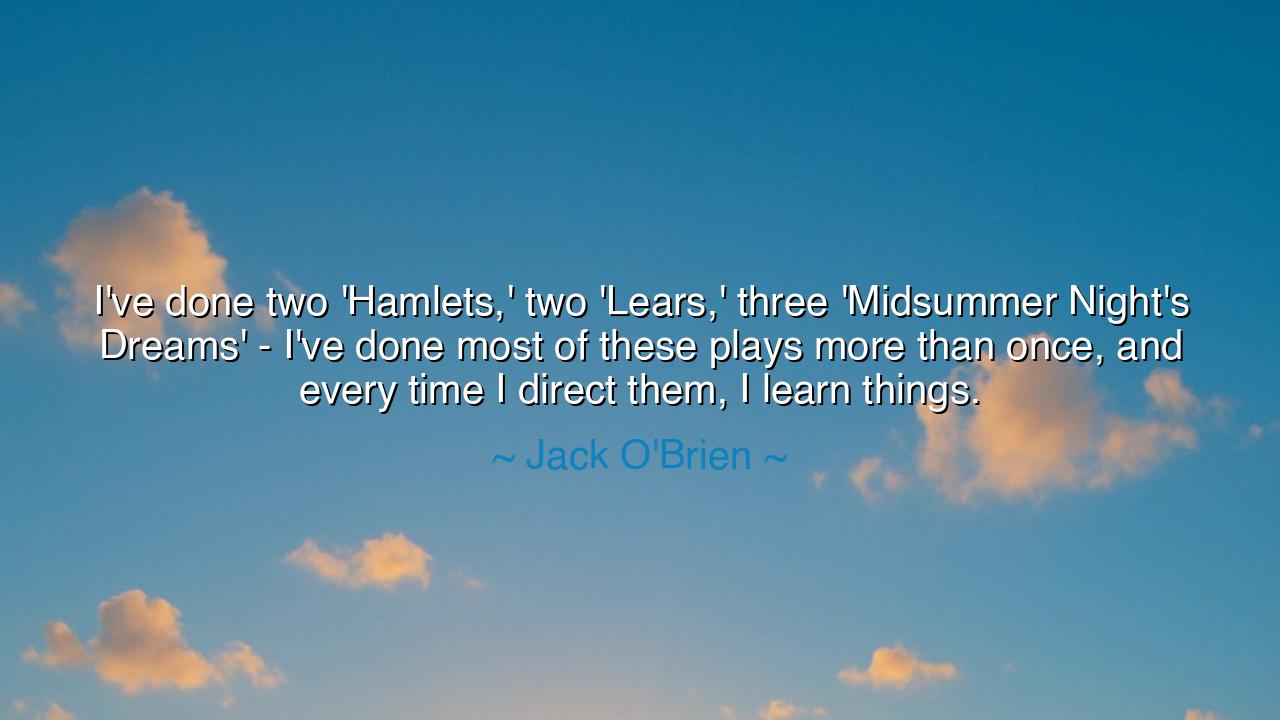
I've done two 'Hamlets,' two 'Lears,' three 'Midsummer Night's
I've done two 'Hamlets,' two 'Lears,' three 'Midsummer Night's Dreams' - I've done most of these plays more than once, and every time I direct them, I learn things.






In the vast sea of human experience, there are few things more profound than the pursuit of mastery, for true mastery is not the final destination, but the eternal journey of discovery. The words of Jack O'Brien, “I've done two 'Hamlets,' two 'Lears,' three 'Midsummer Night's Dreams' - I've done most of these plays more than once, and every time I direct them, I learn things,” carry within them the essence of this truth. These plays, penned by Shakespeare, are not merely words on paper; they are living, breathing entities that continue to evolve with every performance. To revisit them time and time again, O'Brien suggests, is not a repetitive act of rote learning, but an invitation to discover anew the depths of their meaning.
In the ancient world, great thinkers and sages often spoke of knowledge not as a single point in time but as a continual unfolding. The philosopher Aristotle believed that wisdom was an unending pursuit, and that every experience, every encounter, every study was an opportunity to gain new insight. This is what O'Brien speaks of—how each performance of a familiar play reveals something hidden, something deeper, something that had eluded the director's gaze before. The classics, whether in literature, theater, or philosophy, are not static—they are dynamic, ever-changing reflections of the human soul, and their meaning grows with the one who engages with them.
To direct Shakespeare’s works is not simply to bring words to life, but to engage in an eternal dance between the past and the present. Consider the tale of Sophocles, who wrote his tragedies for an ever-changing audience. Oedipus Rex, though steeped in ancient tradition, spoke powerfully to the Athenians of his time, and every performance carried with it new layers of meaning, new lessons for the audience. In this way, the works of great playwrights become living texts—constantly reshaped by the minds and hearts of those who encounter them. O'Brien’s repeated encounters with Hamlet, Lear, and Midsummer Night's Dream are not a mere return to a well-trodden path, but a journey into the unknown depths of human experience.
This truth is also seen in the life of Leonardo da Vinci, whose genius lay not in his perfection but in his unceasing curiosity. Even as he painted the Mona Lisa, a work regarded as one of the greatest masterpieces of all time, he was constantly seeking to improve, to learn more about anatomy, light, and shadow. Leonardo’s genius was not that he completed his works but that he was always searching, always looking for ways to see the world through a different lens. O'Brien, in his repeated returns to Shakespeare’s works, echoes this same curiosity, this same drive to learn and grow, even after achieving mastery.
To learn things with each revisit to the stage is the mark of the true artist. For many, the work may become routine, a task to be checked off. But for those like O’Brien, the act of directing becomes a conversation—a dialogue between the artist, the text, and the audience. Each interpretation brings new insight, and each performance reveals a new layer of meaning. This is the gift of the great works—they are not fixed in time but alive with possibilities. To engage with them is to engage with the eternal truths of the human condition—love, jealousy, betrayal, redemption—which never cease to hold relevance, no matter the age or circumstance.
And so, we learn a valuable lesson from O'Brien’s journey. Mastery is not the end, but the beginning of a deeper understanding. In our own lives, we too must approach our endeavors with this same mindset: to learn anew, to seek growth and understanding, even in the familiar. Whether in our careers, relationships, or personal passions, the key is to never stop revisiting, never stop reflecting, and never stop learning. Like O'Brien, we must see each familiar task, each repetitive challenge, not as a burden, but as an opportunity to dive deeper into the essence of what we do and to find something fresh, something more profound, each time we encounter it.
Therefore, let us embrace the wisdom of the ancients and of O'Brien’s words. The true path to growth is not in moving from one thing to the next but in revisiting, reinterpreting, and discovering the new truths hidden in the familiar. Let each moment, each experience, be a chance to learn, to see through a new lens, and to grow deeper in wisdom and understanding. For in doing so, we not only unlock the secrets of the world but also the secrets of ourselves.






AAdministratorAdministrator
Welcome, honored guests. Please leave a comment, we will respond soon